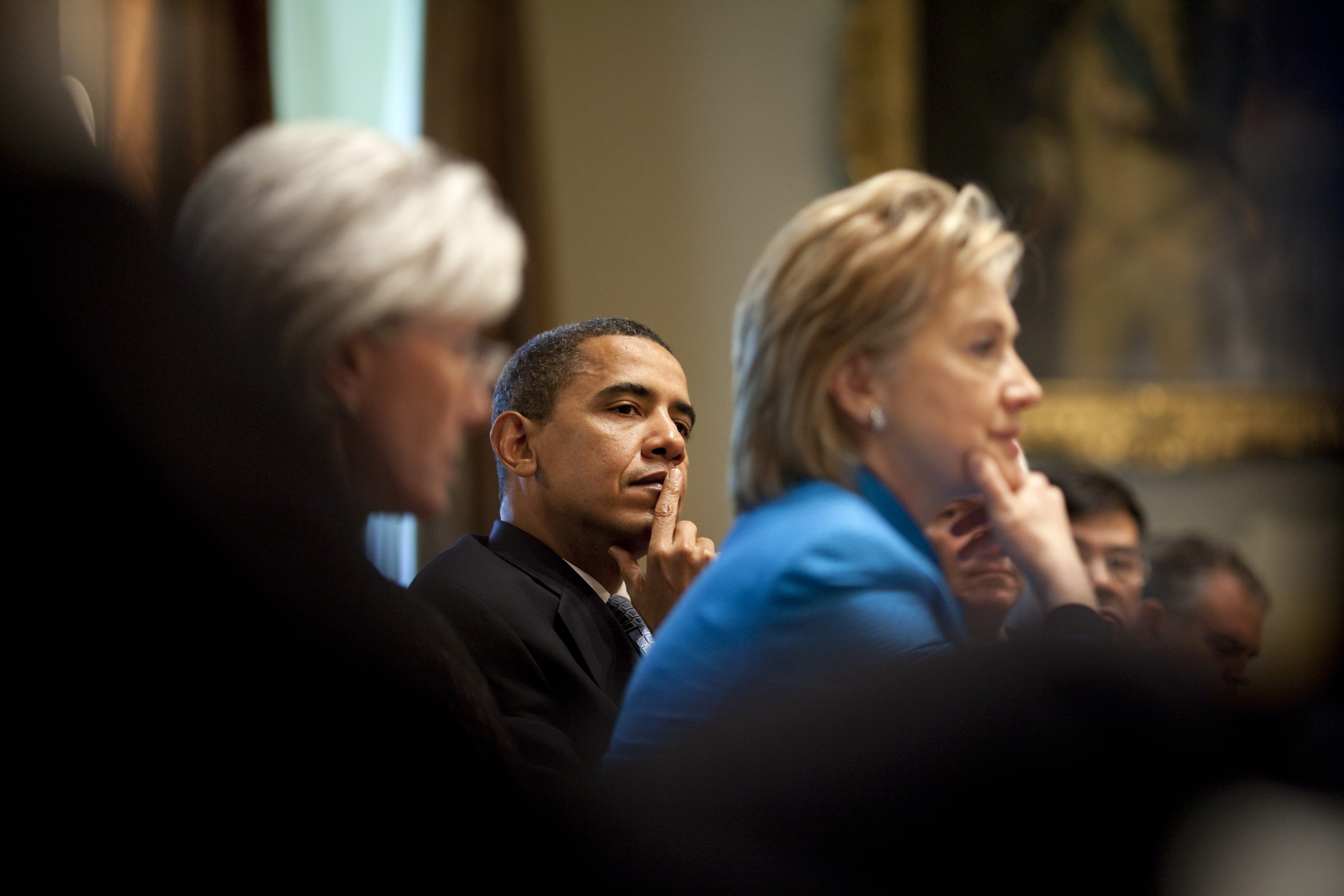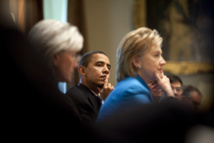There’s more than a year before the presidential elections in the United States starts, but the campaign is, in fact, has already been launched. Politicians have announced their participation in the race, making pre-election statements, including foreign policy. Let us try to figure out who advises candidates for the presidency of the United States, and what kind of advice these people can give.
Traditionally, the Americans are interested in international issues less than domestic. However, the presidential race, which started a few months ago, in this sense, has become an exception. Back in February, opinion polls showed surprising results: Many Americans (41 percent) are convinced that the election campaign in 2016 will be centered around foreign policy.
This can be explained by several factors. Society’s low rating of foreign policy of the current administration is making it a successful target for criticism. The scandalous discord between the Congress and the White House about the actions of the United States on the international scene attracts the attention of the voters. Finally, Hillary Clinton, the former secretary of state, attending the race, simply does not leave her rivals other choice but to study maps and take for their foreign guru as mentors.
Among the leaders of the Republican race, perhaps only Marco Rubio can boast of a serious foreign policy baggage. Since 2011, the young senator from Florida State has been in the Committee on Foreign Affairs and of Intelligence. According to the candidate, he "has access to the confidential information that only the US government has." In addition, during this time, he made 15 trips abroad, and met many heads of governments.
Oddly enough, but at first, Rubio the Republican’s education was given to him by Democrat John Kerry, at the time head of the Committee on Foreign Affairs. Later, this role was replaced by Jamie Fly, the former adviser to President George W. Bush, mainly famous as one of the founders of the neo-conservative center "foreign policy initiatives." This structure aims to maintain tradition of aggressive defense of American interests in the international arena, pledged during the George W. Bush’s regimen. Interestingly, Rubio, an American of Cuban origin, stands out from others by his extremely negative attitude to the establishment of relations with Havana.
Jeb Bush, the former governor of Florida, may not have significant experience in foreign policy, but an there is an impressive army of supporters behind him. In February, he announced an extensive list of his advisors on foreign policy, which included neoconservatives from the environment of his father, the 41st president, George H.W. Bush, his brother, the 43rd President George W. Bush and Republican Ronald Reagan, 40th President of the United States.
Among others, there appeared former CIA chiefs Porter Goss and Michael Hayden, former Secretary of State James Baker (who was in office at the time of the collapse of the USSR), the former national security adviser, Stephen Hadley, the first in US history, the Minister of National Security Tom Ridge, head of the World Bank President Robert Zoellick, and his successor, Paul Wolfowitz. The latter, incidentally, has formulated the doctrine that the United States by any means should interfere with the formation of regional powers.
Although the impressing authority of the names, analysts believe that they can do a disservice to Jeb Bush. First, this list once questioned his statement that he is "boss by his own" and his views "are influenced by his own way of thinking and his own experience." Second, today the team of Bush faces a difficult task: without abandoning the rich political heritage of the family, he must distance himself from the Iraq campaign of his brother, that the majority of Americans believe to be the foreign policy mistake.
Wisconsin Governor Scott Walker is trying not to be outdone by his own party. However, so
far, he succeeds with great difficulty. Never before having any dealings with foreign policy, he often found himself in awkward situations during his foreign trips. In the UK, for example, his statement that Prime Minister David Cameron questioned the leadership qualities of Barack Obama during a private talk, almost led to a diplomatic scandal.
However, every day Walker is working on correcting errors. In his campaign’s headquarters, he even started a tradition: every morning he brings a daily summary of world events, like the one that receives the President. Every day, this digest is being composed by Mike Gallagher - a specialist on the Middle East dealing with intelligence while serving in Iraq and Reagan Thompson, in charge of the Asian direction.
Despite some progress, in his speeches Walker is still trying to avoid the details, using vague language that can satisfy a typical Republican voter. For example, during his last around the country, he promised to abandon the deal with Iran, tighten the pressure on Russia and China, as well as a sharp increase in defense spending. "The United States needs a foreign policy that will allow to put the blade close to the neck of our enemies" - summed up Walker.
Whatever may the foreign policy slogans of the candidates seem aggressive, they do not go to any comparison with what says Donald Trump - the billionaire businessman, entertainer, and to everyone's amazement, the current leader of the Republican race.
According to Trump, all immigrants from Mexico - criminals and rapists, and it is necessary to dissociate ourselves from the country by a concrete wall. "Islamic State" has just built hotel in Syria and laid hands on all the Iraqi oil, which Americans had to take away. Barack Obama is so weak in the international arena that cannot even gain the respect of Vladimir Putin. The US government has not yet managed to conclude any transaction with China on favorable terms. Not only some business partners turned away from him after these theses, but many Republicans also.
The newspaper "New York Times" tried to find someone with whom Donald Trump advises on foreign policy, and concluded that the man's name - Donald Trump. Unlike the other candidates, surrounded himself with numerous advisors, Trump rely only on his usual team – managers of his global empire. In general, he said, he pays the campaign no more than 50 percent of their time and does not see any sense to delve into foreign policy issues, because "the world situation is changing every day."
Hillary Clinton almost single-handedly confronts the whole of this army of Republican hawks. After the entry into the race, she every now and then have to beat off the attacks of opponents, who accuse her of being in charge of that the US is now bogged down in the Middle East, was not able to formulate a clear plan of action against Russia, turned a blind eye to China intensified, lost confidence in the European partners, not to mention the attack on the US embassy in Tripoli.
Clinton's team consists mainly of her husband's colleagues and former colleagues at the State Department. Her confidant on matters of international relations - Jake Sullivan, actively participated in the negotiations on Iran. Despite all attempts to move away from the unpopular foreign policy of the current administration, Hillary Clinton does not offer major changes. After all, she stood at the origins of the "Asian turnaround" when the country began a dialogue with Tehran.
The closest competitor against Hillary nominated from the Democratic Party - Senator Bernie Sanders of Vermont. A political consultant Tad Devine, participated in the presidential campaign of Al Gore in 2000 and John Kerry in 2004, helps to reduce the backlog. Sanders is a Washington survivor, calling himself a "democratic socialist". His foreign policy is being revealed not by people
around him, but the story of his votes in Congress. For example, he has always opposed the deployment of US troops abroad, did not support the extension of powers of the intelligence services, considers it necessary to reduce costs in the defense and also claimed that the conclusion of large-scale international trade agreements leads to an increase in unemployment in the United States.
Be that as it may, we should not forget that the most loud foreign policy statements are just part of the election campaign, and after settling into the White House, politics usually change the tone of the rhetoric for more moderate. In the book "Obama's Wars", describing the difficulties encountered the newly elected President in carrying out his campaign promises, Bob Woodward said: "All of the Obama campaign has focused on the rejection of Bush's ideas and approaches. But he may have underestimated how tendencies, inherited from previous president, had deeply rooted - he was surrounded by the system, people and general thinking, adjusted for the war."
based on NYT materials
Traditionally, the Americans are interested in international issues less than domestic. However, the presidential race, which started a few months ago, in this sense, has become an exception. Back in February, opinion polls showed surprising results: Many Americans (41 percent) are convinced that the election campaign in 2016 will be centered around foreign policy.
This can be explained by several factors. Society’s low rating of foreign policy of the current administration is making it a successful target for criticism. The scandalous discord between the Congress and the White House about the actions of the United States on the international scene attracts the attention of the voters. Finally, Hillary Clinton, the former secretary of state, attending the race, simply does not leave her rivals other choice but to study maps and take for their foreign guru as mentors.
Among the leaders of the Republican race, perhaps only Marco Rubio can boast of a serious foreign policy baggage. Since 2011, the young senator from Florida State has been in the Committee on Foreign Affairs and of Intelligence. According to the candidate, he "has access to the confidential information that only the US government has." In addition, during this time, he made 15 trips abroad, and met many heads of governments.
Oddly enough, but at first, Rubio the Republican’s education was given to him by Democrat John Kerry, at the time head of the Committee on Foreign Affairs. Later, this role was replaced by Jamie Fly, the former adviser to President George W. Bush, mainly famous as one of the founders of the neo-conservative center "foreign policy initiatives." This structure aims to maintain tradition of aggressive defense of American interests in the international arena, pledged during the George W. Bush’s regimen. Interestingly, Rubio, an American of Cuban origin, stands out from others by his extremely negative attitude to the establishment of relations with Havana.
Jeb Bush, the former governor of Florida, may not have significant experience in foreign policy, but an there is an impressive army of supporters behind him. In February, he announced an extensive list of his advisors on foreign policy, which included neoconservatives from the environment of his father, the 41st president, George H.W. Bush, his brother, the 43rd President George W. Bush and Republican Ronald Reagan, 40th President of the United States.
Among others, there appeared former CIA chiefs Porter Goss and Michael Hayden, former Secretary of State James Baker (who was in office at the time of the collapse of the USSR), the former national security adviser, Stephen Hadley, the first in US history, the Minister of National Security Tom Ridge, head of the World Bank President Robert Zoellick, and his successor, Paul Wolfowitz. The latter, incidentally, has formulated the doctrine that the United States by any means should interfere with the formation of regional powers.
Although the impressing authority of the names, analysts believe that they can do a disservice to Jeb Bush. First, this list once questioned his statement that he is "boss by his own" and his views "are influenced by his own way of thinking and his own experience." Second, today the team of Bush faces a difficult task: without abandoning the rich political heritage of the family, he must distance himself from the Iraq campaign of his brother, that the majority of Americans believe to be the foreign policy mistake.
Wisconsin Governor Scott Walker is trying not to be outdone by his own party. However, so
far, he succeeds with great difficulty. Never before having any dealings with foreign policy, he often found himself in awkward situations during his foreign trips. In the UK, for example, his statement that Prime Minister David Cameron questioned the leadership qualities of Barack Obama during a private talk, almost led to a diplomatic scandal.
However, every day Walker is working on correcting errors. In his campaign’s headquarters, he even started a tradition: every morning he brings a daily summary of world events, like the one that receives the President. Every day, this digest is being composed by Mike Gallagher - a specialist on the Middle East dealing with intelligence while serving in Iraq and Reagan Thompson, in charge of the Asian direction.
Despite some progress, in his speeches Walker is still trying to avoid the details, using vague language that can satisfy a typical Republican voter. For example, during his last around the country, he promised to abandon the deal with Iran, tighten the pressure on Russia and China, as well as a sharp increase in defense spending. "The United States needs a foreign policy that will allow to put the blade close to the neck of our enemies" - summed up Walker.
Whatever may the foreign policy slogans of the candidates seem aggressive, they do not go to any comparison with what says Donald Trump - the billionaire businessman, entertainer, and to everyone's amazement, the current leader of the Republican race.
According to Trump, all immigrants from Mexico - criminals and rapists, and it is necessary to dissociate ourselves from the country by a concrete wall. "Islamic State" has just built hotel in Syria and laid hands on all the Iraqi oil, which Americans had to take away. Barack Obama is so weak in the international arena that cannot even gain the respect of Vladimir Putin. The US government has not yet managed to conclude any transaction with China on favorable terms. Not only some business partners turned away from him after these theses, but many Republicans also.
The newspaper "New York Times" tried to find someone with whom Donald Trump advises on foreign policy, and concluded that the man's name - Donald Trump. Unlike the other candidates, surrounded himself with numerous advisors, Trump rely only on his usual team – managers of his global empire. In general, he said, he pays the campaign no more than 50 percent of their time and does not see any sense to delve into foreign policy issues, because "the world situation is changing every day."
Hillary Clinton almost single-handedly confronts the whole of this army of Republican hawks. After the entry into the race, she every now and then have to beat off the attacks of opponents, who accuse her of being in charge of that the US is now bogged down in the Middle East, was not able to formulate a clear plan of action against Russia, turned a blind eye to China intensified, lost confidence in the European partners, not to mention the attack on the US embassy in Tripoli.
Clinton's team consists mainly of her husband's colleagues and former colleagues at the State Department. Her confidant on matters of international relations - Jake Sullivan, actively participated in the negotiations on Iran. Despite all attempts to move away from the unpopular foreign policy of the current administration, Hillary Clinton does not offer major changes. After all, she stood at the origins of the "Asian turnaround" when the country began a dialogue with Tehran.
The closest competitor against Hillary nominated from the Democratic Party - Senator Bernie Sanders of Vermont. A political consultant Tad Devine, participated in the presidential campaign of Al Gore in 2000 and John Kerry in 2004, helps to reduce the backlog. Sanders is a Washington survivor, calling himself a "democratic socialist". His foreign policy is being revealed not by people
around him, but the story of his votes in Congress. For example, he has always opposed the deployment of US troops abroad, did not support the extension of powers of the intelligence services, considers it necessary to reduce costs in the defense and also claimed that the conclusion of large-scale international trade agreements leads to an increase in unemployment in the United States.
Be that as it may, we should not forget that the most loud foreign policy statements are just part of the election campaign, and after settling into the White House, politics usually change the tone of the rhetoric for more moderate. In the book "Obama's Wars", describing the difficulties encountered the newly elected President in carrying out his campaign promises, Bob Woodward said: "All of the Obama campaign has focused on the rejection of Bush's ideas and approaches. But he may have underestimated how tendencies, inherited from previous president, had deeply rooted - he was surrounded by the system, people and general thinking, adjusted for the war."
based on NYT materials



















